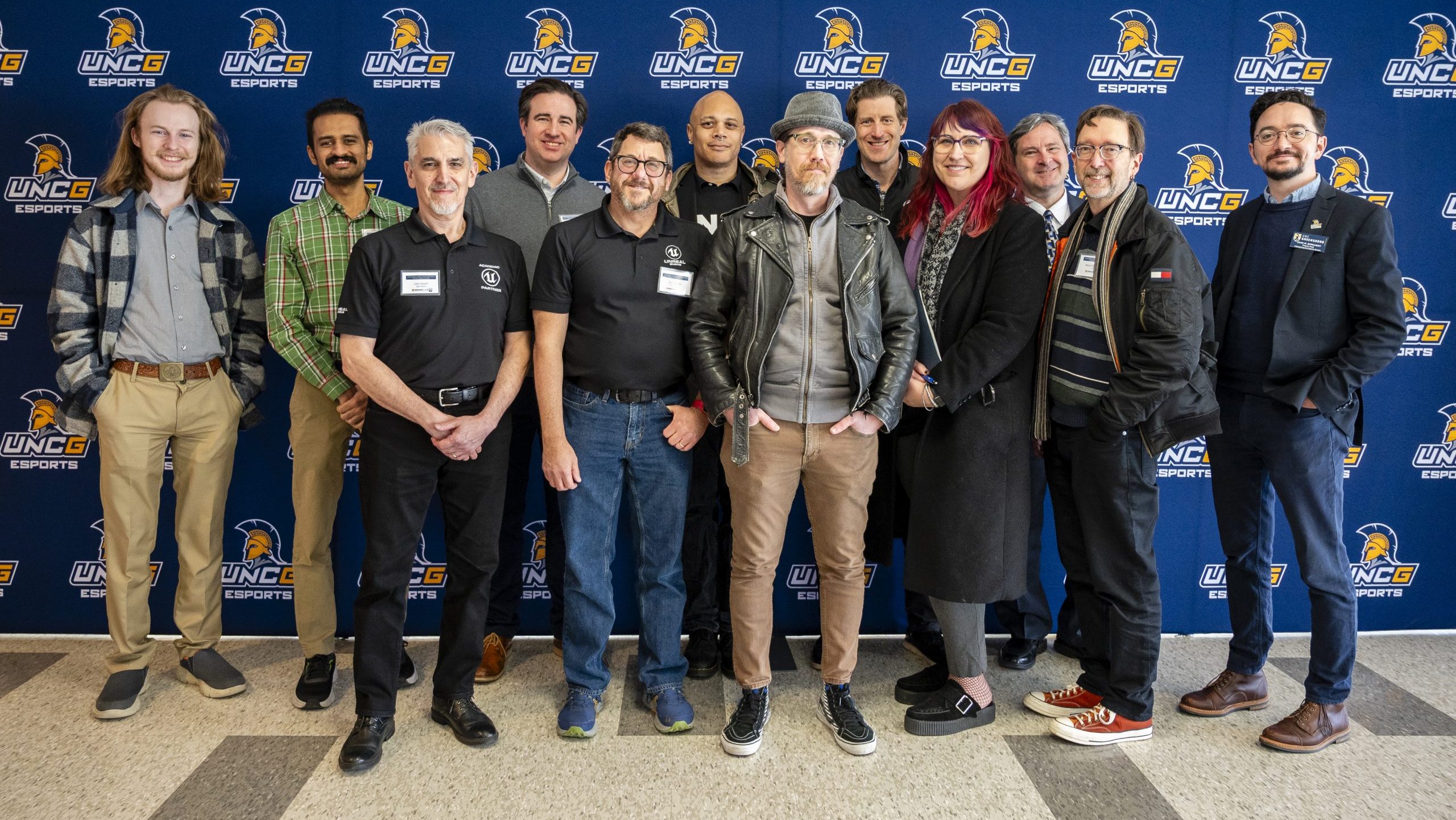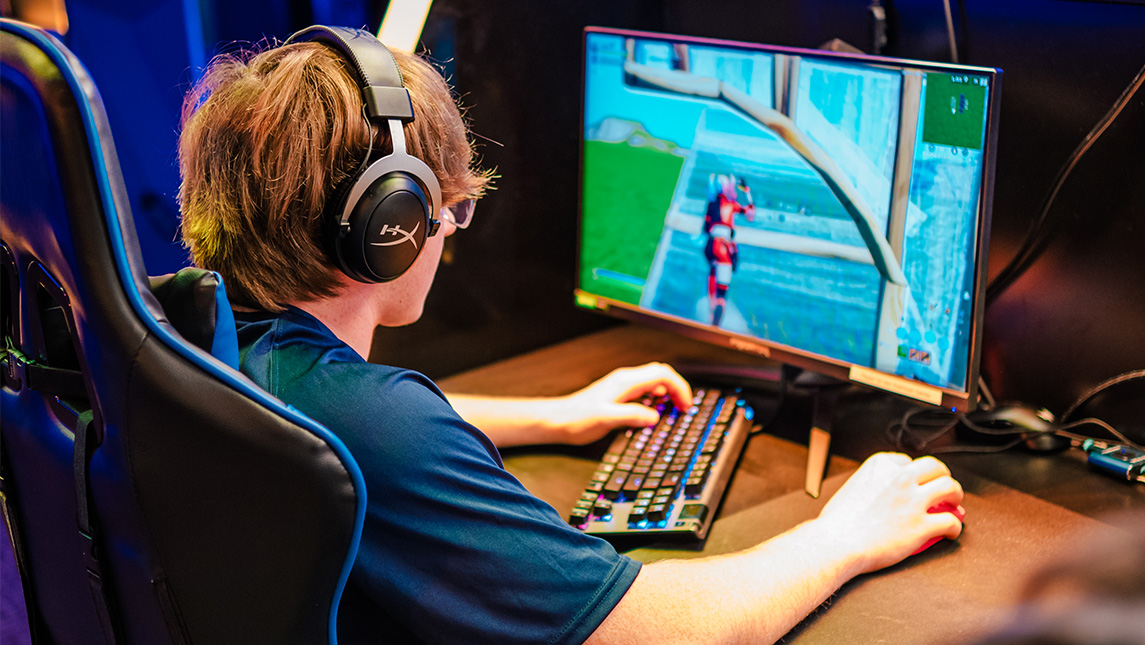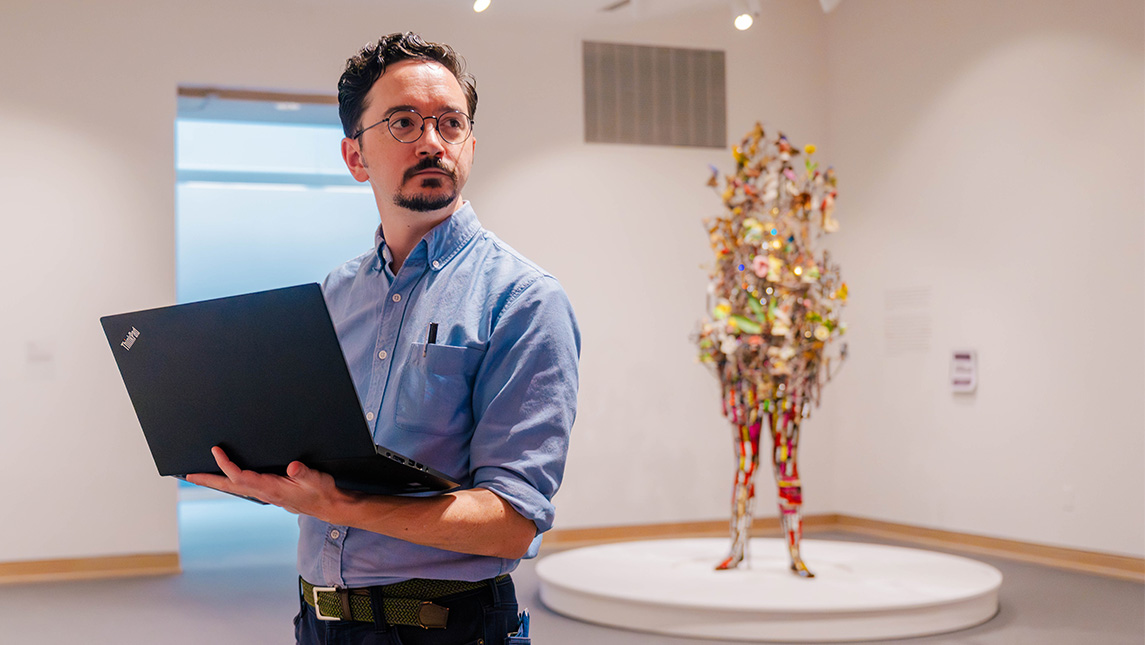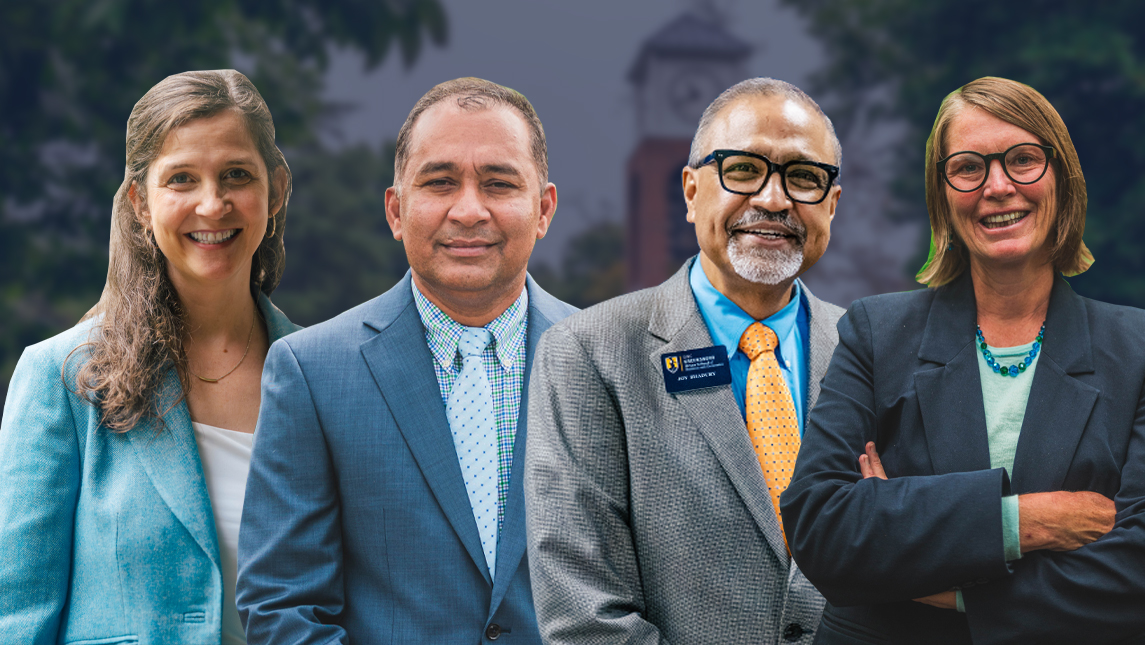A Q&A with Dr. John Borchert, director of UNCG’s Network for the Cultural Study of Videogaming
In January, UNC Greensboro was chosen as one of just 36 U.S. universities – and one of just three in North Carolina – for an Unreal Academic Partnership by Cary-based Epic Games, makers of Unreal Engine 3D computer graphics tool and Fortnite, one of the world’s most popular video games. Dr. John Borchert, director of UNCG’s Network for the Cultural Study of Videogaming, created UNCG’s Unreal Fellows program. The fellowship is tasked with leading the integration of Unreal Engine tech into their research and teaching, with the shared goal of improving the student experience, increasing student exposure to cutting-edge industry standards, and raising the bar for interactive media at the University.
Describe this new partnership between Epic Games and UNCG
The Unreal Academic Partnership is a recognition by Epic Games, the producer of the Unreal Engine, that UNC Greensboro has met a certain level of expertise and capacity with the technology to be authorized as an Unreal Academic Partner, a recognition that we have integrated their technology into our university in a number of ways.
In our curriculum and in our research profile, we have the capacity to teach Unreal Engine to our undergraduate students, and our faculty are using Unreal Engine in their own research and productive or creative works. It’s the recognition that we’re leading the way with this kind of technology and that we are a strong partner with Epic Games.

How does it differ from the University’s existing relationship with Epic Games?
Epic has been a great partner since the start of our esports journey. We collaborated with Epic on our E2 weekends, which were aimed at statewide tournaments using Epic or Unreal Properties that also had an educational angle. Educators and students throughout the state attended a daylong workshop to learn how to use Unreal Engine or at our one-off engagements, which we have done every once or twice a semester. Those really laid the groundwork for this larger relationship.
The Unreal Academic Partnership allows us to build a two-way street of productivity and collaboration over the years so that we’ll be working more actively with Epic and Unreal Engine in a more explicit way.
Since the start of our esports journey, UNCG has been aiming to show how the technologies involved in the larger world of esports could be activated through our academics, our competition, and our workforce development.
How did it happen?
When I was lucky enough to be able to oversee the academic and curricular profile for the gaming and esports on campus, one of the goals that we had as a clear metric about 18 months ago was to be an Unreal Academic Partner.
Part of my task was to reverse engineer that and get us to where we needed to be. The program that I built was called our Unreal Fellows, just because it’s a great name, right?
These are faculty from Media Studies, Animation, and our School of Music who really believe in the value of this technology for their students.
For us to meet the required metrics of Epic Games, they needed to have a substantial engagement with Unreal Engine in their curricula for at least one academic year, which gave a boost to that curriculum.
We’ve done some nice engagements with Epic up until now, but seeing this journey from esports being born in the arena and then how it has expanded across campus, a lot of that credit goes to those fellows for building and teaching those classes and really engaging with the technology in a way that no single unit could do.
What exactly does Unreal Engine do?
Unreal Engine is a real-time 3D rendering engine. It renders objects in real time in three dimensions. That means it can make things in three dimensions very quickly. It’s used as the platform for many successful and highly technologically sophisticated video games. That was what it was built for. But its use has spread into pieces of media and pieces of creative art that lots more people are being exposed to, day in and day out: television shows with what they call a virtual production background, which has in a lot of ways replaced green screen technology.
People are familiar with green screen technology, which allows you to swap out an image for a green screen. Virtual production using an engine like Unreal allows for that background to be built and interacted with in real-time. So instead of using a green screen, you’d use a mass of what’s basically a giant curved television that you would stand in front of, and the Unreal Engine would build behind the characters or the sets or whatever you’re filming that interacts with the camera and the characters in real-time. It’s faster, it’s easier to manipulate, it’s cheaper to use it.
Other places where 3D engines are being used are in advanced manufacturing, advertising, architecture, and design because what a real-time 3D engine allows you to do is build something in real space and in real-time, allowing you to interact with it, with the kind of facility that a paper or pencil or even an advanced video cannot. You could build a skyscraper with a 3D engine and manipulate it quickly and cheaply. Or you could prototype products within a 3D engine and be able to manipulate them without the time and expense of actually building those things in real space.
Engines like Unreal have uses that began in the gaming industry but extend beyond that, and I think that is a metaphor for what we do with esports at the university: show folks that the kinds of skills and technologies that are born out of videogames can extend throughout other sorts of industries.

What are the most important benefits to UNCG and the community?
The skill sets and technologies utilized in video games are a proof of concept that the technologies our students and our faculty are developing – whether it be through esports or gaming, animation, virtual production, or the 3D rendering that we’re doing – they demonstrate that UNCG is committed to this new media environment and that advanced technologies like the ones involved in Unreal Engine require careful thought and expertise, and that we at UNCG are being responsible leaders in that space allowing us to be influencers in this industry. UNCG is a place to learn and create things in this advanced technological space.
How can students get more involved?
In any number of ways. The most curricular would be our Video Gaming and Esports Studies minor. We hope to announce a major coming in the fall. These are both interdisciplinary programs built around three areas of study: game studies, which is the deconstructive study of games, so taking games apart and studying them for what they are; game design, which is making games and putting them back together; and then esports studies, which is looking at the industry of esports and all the different ways that students can engage with that.
We also have the award-winning Esports and Gaming Club, which is one of the largest student clubs on campus. This club involves community and competitive gaming events that engage with all of these technologies. Our Game Development Club is an interdisciplinary club that focuses on the overall creation of smaller projects through game jams and personal projects.
We also offer extensive career, workforce development, and guidance programming in partnership with Innovate UNCG and the UNCG esports program. Students who are interested can turn what they’re learning here into being workforce and career-ready. We have career counseling, internships, and connections across the state.
Story by Brian Clarey, University Communications
Photography by David Lee Row, University Communications
Additional photography courtesy of Epic Games















